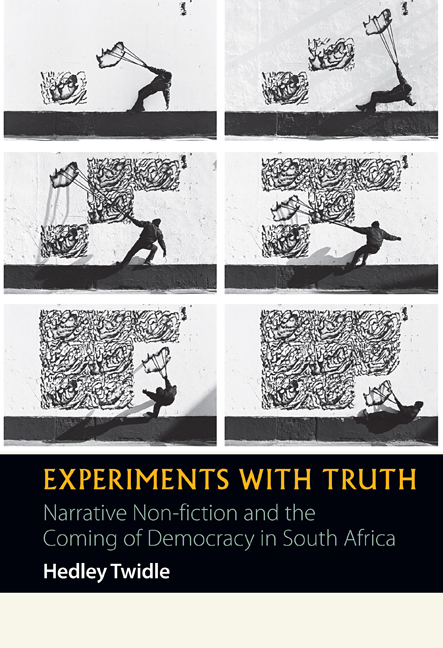Book contents
- Frontmatter
- Contents
- Preface: Encountering non-fiction
- 1 Introduction: Historical and theoretical approaches
- 2 Unusable pasts: The secret history of Demetrios Tsafendas: assassin, madman, messenger
- 3 Literatures of betrayal: Confession, collaboration and collapse in post-TRC narrative
- 4 In search of lost archives: Nostalgia, heterodoxy and the work of memory
- 5 A very strange relationship: Ambition, seduction and scandal in post-apartheid life writing
- 6 Some claim to intimacy: Political biography and the limits of the liberal imagination
- 7 In short, there are problems: Literary journalism in the postcolony
- 8 Unknowable communities: Necessary fictions and broken contracts in the heart of the country
- 9 A new more honest code: Memoirs of the ‘born frees’ and the futures of non-fiction
- 10 Afterword: The extracurriculum
- Bibliography
- Index
- Miscellaneous Endmatter
3 - Literatures of betrayal: Confession, collaboration and collapse in post-TRC narrative
Published online by Cambridge University Press: 11 September 2020
- Frontmatter
- Contents
- Preface: Encountering non-fiction
- 1 Introduction: Historical and theoretical approaches
- 2 Unusable pasts: The secret history of Demetrios Tsafendas: assassin, madman, messenger
- 3 Literatures of betrayal: Confession, collaboration and collapse in post-TRC narrative
- 4 In search of lost archives: Nostalgia, heterodoxy and the work of memory
- 5 A very strange relationship: Ambition, seduction and scandal in post-apartheid life writing
- 6 Some claim to intimacy: Political biography and the limits of the liberal imagination
- 7 In short, there are problems: Literary journalism in the postcolony
- 8 Unknowable communities: Necessary fictions and broken contracts in the heart of the country
- 9 A new more honest code: Memoirs of the ‘born frees’ and the futures of non-fiction
- 10 Afterword: The extracurriculum
- Bibliography
- Index
- Miscellaneous Endmatter
Summary
In July 1964, during a wave of raids across South Africa, the apartheid security police arrested several members of the African Resistance Movement (ARM). This was an underground organisation of ex-communists and liberals-become- radicals who had sabotaged pylons and other infrastructural targets in an effort to send a message, post-Sharpeville, that serious, principled resistance was still alive in South Africa. Soon after being taken into detention, one of its members began to talk. Adrian Leftwich had been a charismatic student activist responsible for recruiting many of the ARM members; his ambition meant that he knew too much about an organisation that was supposed to be built from secret cells. His exhaustive and gratuitously detailed testimony, first in detention and then as a state witness, was used to convict his closest friends and associates. To refer to him as a rat was hard on genus Rattus, the apartheid judge remarked when sentencing those at whose expense he had bought his freedom.
In a 2002 edition of Granta magazine, Leftwich published ‘I Gave the Names’, a piece which had taken him 15 years to write. ‘What follows’, we read in the opening section, ‘is as much an essay in the personal politics of fear as it is in the politics of failure and betrayal’ (11). The piece is striking in the extent of its self-examination and self-disclosure (the detail about him giving rats a bad name is, after all, drawn from this very essay). And yet this confession was variously judged as sincere and powerful, inadequate and evasive, by the different individuals affected by his actions.
‘I Gave the Names’ is a reckoning with self in prose – a shameful and even reprehensible self – that takes the reader into some of the most difficult and unstable registers of autobiographical awareness. How, for example, can one navigate through those difficult terrains where life writing embodies both a strenuous attempt at self-understanding and the concurrent drift towards selfexoneration that follows on from any enlarged understanding of wrongdoing? Further quandaries open up on reading a confession that is self-consciously aware of precisely such problems – and which, indeed, anticipates and writes them into itself. What happens when a confession is too perfect?
- Type
- Chapter
- Information
- Experiments with TruthNarrative Non-fiction and the Coming of Democracy in South Africa, pp. 47 - 70Publisher: Boydell & BrewerPrint publication year: 2019

